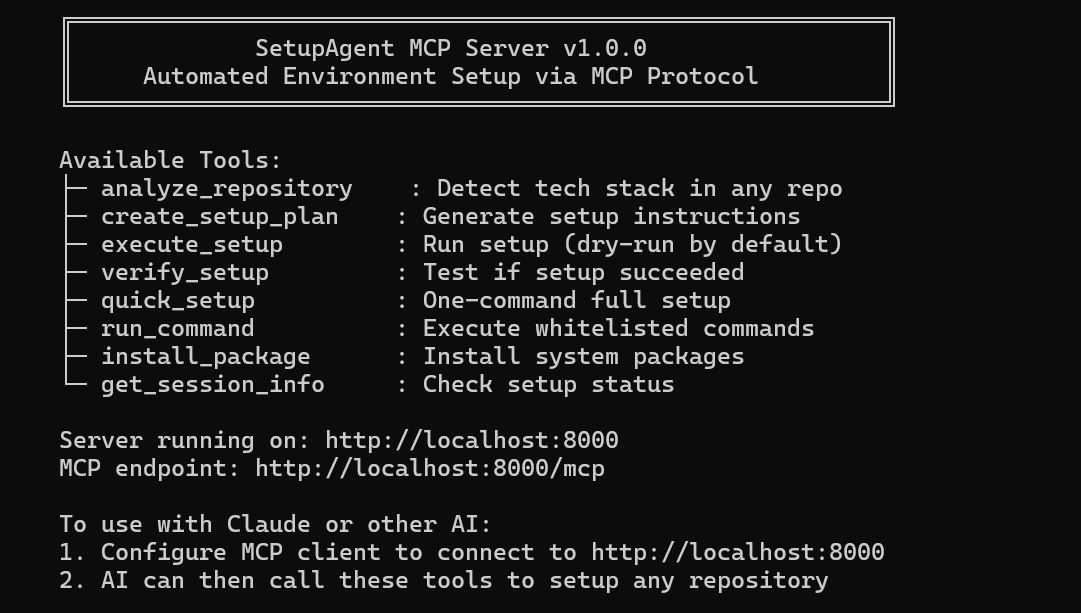Provides full system package management through apt, enabling automatic installation of development dependencies and system packages on Ubuntu/Debian systems
Detects Docker and docker-compose configurations in projects and suggests containerized development environment setup alongside local installation options
Provides safe git operations including repository cloning and basic version control commands for setting up development environments
Analyzes GitHub repositories to automatically detect project stacks, generate reproducible setup plans, and configure development environments with proper toolchains and dependencies
Detects Gradle build configurations, installs appropriate versions, and runs build verification for Java projects using Gradle
Detects Node.js projects and automatically configures the appropriate package manager (npm/yarn/pnpm) with proper dependency installation and testing
Automatically detects Java version requirements and installs the appropriate OpenJDK version for Java development environments
Automatically detects Python projects, manages pip/uv dependencies, sets up virtual environments, and runs pytest verification for Python development stacks
Provides full system package management through apt, enabling automatic installation of development dependencies and system packages on Ubuntu/Debian systems
Click on "Install Server".
Wait a few minutes for the server to deploy. Once ready, it will show a "Started" state.
In the chat, type
@followed by the MCP server name and your instructions, e.g., "@Setup Agent MCPset up a development environment for https://github.com/spring-projects/spring-petclinic"
That's it! The server will respond to your query, and you can continue using it as needed.
Here is a step-by-step guide with screenshots.
Setup Agent - Dev Environment Setup
Give me a repo link—I’ll set up the environment.

SetupAgent analyzes a GitHub repository, generates a reproducible setup plan, optionally installs system/tooling dependencies, and verifies the project can build or start.
It works standalone from the CLI and can also be driven by an AI assistant via MCP.
Table of Contents
Related MCP server: GitHub MCP Server
What It Solves
Unknown or mismatched toolchains (JDK/Maven/Gradle, Python/pip, Node/npm/yarn/pnpm)
Version drift and missing system packages
Manual IDE tweaks (e.g., Lombok / annotation processing)
Container vs. local environment confusion
Key Features
Auto-detection: Java, Python, Node.js; build tools; container files (
Dockerfile,docker-compose.yml,.devcontainer/)Reproducible plan: Emits
plan.yaml(machine) +SetupPlan.md(human)Dry-run by default: Preview exactly what would run; real execution only with
--assume-yesSafe execution: Strict command allowlist, timeouts, and output truncation
Verification: Runs language-appropriate tests/build (
./mvnw test,pytest,npm test)Reports: Summarizes results and next steps in
SetupReport.mdMCP integration: Exposes safe tools so an AI can orchestrate setup
Supported Stacks & OS
Languages / Build
Java (Maven/Gradle; Lombok guidance)
Python (pip/uv)
Node.js (npm/yarn/pnpm)
Operating Systems
Ubuntu/Debian (apt) — fully supported for execution
macOS (Homebrew) and Windows (winget/choco) — interfaces stubbed and ready to extend
Containers
If container files are present, a container plan is suggested alongside a local plan
Requirements
Python 3.10+
Git
Ubuntu/Debian for real execution (apt). macOS/Windows execution paths can be added later.
Install
Tip: It is safe to start in dry-run mode. No system changes are made unless you pass
--assume-yes.
Quick Start (CLI)
Artifacts
plan.yaml— machine-readable planSetupPlan.md— human-readable steps (auto vs. manual)SetupReport.md— execution & verification summarylogs/setup-*.log— detailed logs
MCP Integration (Optional)
Expose SetupAgent’s safe local tools to an AI assistant.
Start the local MCP server
Register with Claude Desktop (user scope)
Check status in Claude chat with /mcp.
Exposed tools
git.clonefs.find/fs.readshell.run(allowlisted commands only)pkg.install(apt; others stubbed)ide.todoartifacts.save
Prefer HTTP instead of stdio? Adapt the server entry point and register the HTTP endpoint with your client.
How It Works
Scan — Clone and inspect the repository for language/build/container signals
Infer — Determine required tools/versions (e.g.,
openjdk-17-jdk,pip/uv,npm/yarn/pnpm)Plan — Emit
plan.yamlandSetupPlan.md(container and local paths when available)Execute — Run allowlisted commands only. Default is dry-run; real execution with
--assume-yesVerify — Run project tests/build targets
Report — Summarize actions, results, and remediation tips
Security Model
Default dry-run — no changes without
--assume-yesAllowlist — only safe prefixes are executed:
git,mvn/./mvnw,gradle/./gradlew,npm/yarn/pnpm,python/pip/uv,apt/sudo apt,docker/docker compose,dotnetTimeouts & truncation — prevents runaway processes and oversized logs
Least privilege —
sudoonly when installing system packages
Roadmap
macOS (brew) and Windows (winget/choco) execution paths
Additional stacks: Go, Rust, .NET
Container health checks and port probes
IDE automation helpers (IntelliJ / VS Code)
FAQ
Do I have to use MCP/AI?
No. The CLI works independently. MCP simply lets an AI drive the same safe tools.
Will it modify my system?
Not unless you pass --assume-yes. Dry-run reads and plans only.
Can I use this for production?
This project targets developer environments. For production, prefer containerized or IaC approaches.